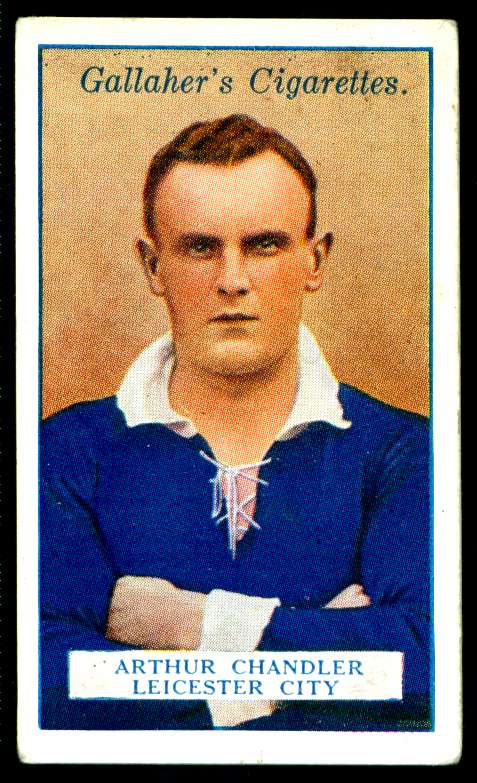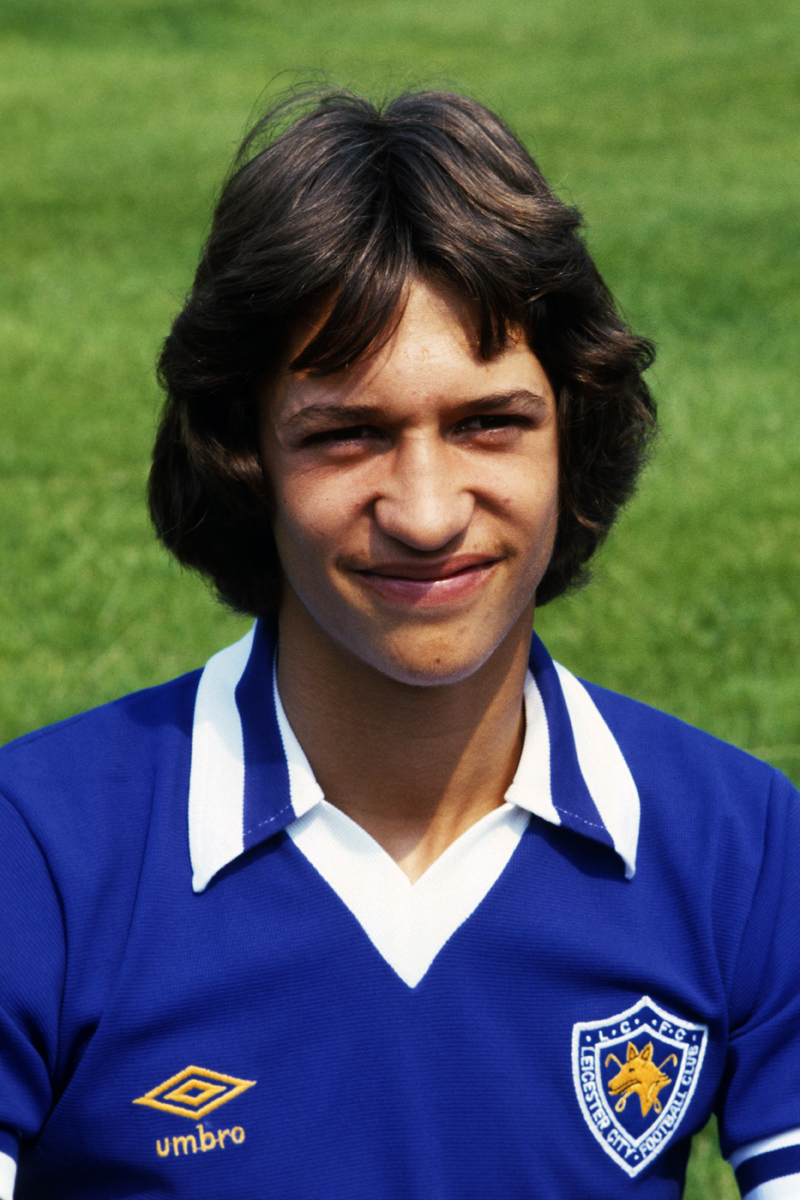The new club joined the fledgling Football League ten years later, having seen success in the Midland League at no less than five different football grounds. The Fosse's first league game was a 4-3 defeat to Grimsby Town, but after moving into their new home on Filbert Street a week later they recorded their first league win against Rotherham United. That first season also saw the club's largest ever win, a 13-0 victory over Notts Olympic in an FA Cup qualifying match.
Between 1904-1908 the Fosse fought hard in the Football League, finishing eventually as runners-up in the Second Division. In 1909, however, they recorded their worst ever defeat, a humiliating 12-0 reverse to neighbours and rivals Nottingham Forest, on their way to relegation from the First Division.
Following the hiatus of the First World War, the 1915 Leicester Fosse club had been dissolved due to financial difficulties and, in reforming the club, Leicester City Football Club was born.
 |
| Top Scorer: Arthur Chandler |
The club's yo-yo reputation was established throughout the 1930s, with first relegation in 1935 before promotion after a championship-winning season in the Second Division in 1939, after which the Football League was again suspended due to the outbreak of war.
 |
| Winners: The second division-winning team from 1953/54, managed by Norman Bullock |
Rowley broke his own goalscoring record in 1957 as the Foxes were once again promoted, with his form of 44 goals in a single season remaining as the club record today. That was to be Rowley's last season with Leicester City as he was sold to Shrewsbury Town, just seven goals short of breaking Chandler's record as all-time top scorer at the club. The unrest amongst Leicester City fans that followed ultimately saw manager David Halliday lose his job.
The next season, Leicester went on to beat Stoke City 4-3 and collect the League Cup for the first time, a feat they would later achieve (twice) under Martin O'Neill. Leicester did contest the League Cup final too in 1964, but lost-out to Chelsea.
Two years later, Gordon Banks stood as England's number one in goal as the nation won the World Cup for the first and only time. He went on to be nominated for the Ballon d'Or, the only Leicester City player - serving or otherwise - to do so.
Following illness, Matt Gillies reign ended with his resignation in 1968, before the club were relegated to end twelve years in top-flight football. Frank O'Farrell, although responsible for the club's demise, did however lead Leicester out at Wembley as they contested the FA Cup final for the last time to date. Leicester lost, again, making them the club to have contested the most FA Cup finals without winning.
 |
| Hot shot: A young Gary Lineker in Foxes colours |
 |
| Legend: Steve Walsh's goal put Leicester into the Premier League under Little |
Little left Filbert Street at the start of the new season to take over a vacant position at Aston Villa, and his successor Mark McGhee was unable to keep Leicester in the Premier League. He did, however, leave Leicester in a firm position atop the new Division One when he unexpectedly left to take over at Wolverhampton Wanderers in December 1995. McGhee's departure, however, was to be the best thing that could have happened to the club.
Martin O'Neill took over as manager of Leicester City Football Club after success at Wycombe Wanderers and a brief stint in charge of Norwich City. O'Neill led Leicester to the play-off final in his first season, with the Foxes beating Crystal Palace 2-1 at Wembley to return to the Premier League. His team consisted of some modern heroes of the club, including Matt Elliott, Neil Lennon and Emile Heskey.Under the Northern Irishman, the club became an established force in the top flight with four successive top-ten finishes and three visits to Wembley in the League Cup within four seasons - as winners in 1997 and 2000 and runners-up to Spurs in 1999. O'Neill became a wanted man and after he turned-down an offer to join Leeds United at the end of the 1999 season he was lured to Scotland, and Celtic, in the summer of 2000. As one of his last acts in charge, Emile Heskey was sold to Liverpool for £11 million, the club's record sale for any player.
 |
| Beloved: O'Neill and skipper Matt Elliott with their second League Cup |
High spending, compounded by poor the management of Taylor, the cost of the new stadium and the collapse of ITV Digital, saw dark days for the club and in October 2002 - two years after topping the Premier League - the club was placed into administration with debts totalling over £30 million. Adams, working within the constraints of a transfer embargo, nonetheless guided Leicester to second place in Division One and automatic promotion back to the Premier League, as a consortium led by Gary Lineker rescued the club from their dire financial plight. In 2004, following relegation from the Premier League after just one season, Adams resigned as manager.
Bassett took over temporarily before Craig Levein was appointed manager, leading the Foxes to their lowest finish in fourteen years. Poor form throughout 2004 and into 2005 saw fans call for the Scot's resignation, and he was eventually sacked with the club in the relegation zone. Rob Kelly replaced Levein temporarily before his good form saw him given the job permanently having assured safety in Division One.
In February 2007, Leicester City was bought-out by Serbo-American business tycoon Milan Mandaric, formerly chairman at Portsmouth. A poor run of form saw Kelly sacked in April that year with the Foxes hovering perilously above the relegation zone, Nigel Worthington securing their safety as he took temporary charge.
 |
| Tycoon: Milan Mandaric bought-out the club in 2007 |
Martin Allen was signed as manager for the new season but after a poor start and the disintegration of his relationship with Mandaric he was shown the door after just three months. Gary Megson was made the next permanent manager but he was swayed to Premier League Bolton Wanderers in October. Ian Holloway became the next manager and it was he that saw the Foxes draw 0-0 at Stoke City on the last day of the Championship season and Leicester City were relegated to the third tier of English football for the first time in their history.
Holloway was sacked and Nigel Pearson appointed as manager after success in temporary charge of Southampton and Newcastle United. Pearson's calm persona saw a steadied Leicester City go 23 games unbeaten en-route to the League One title. Striker Matt Fryatt scored 32 goals to become the first Foxes player to score more than 30 goals in a single season since Arthur Rowley, with his back-to-back hat-tricks also being the first since Arthur Chandler 32 years previously.
A return to the Championship exceeded all expectations and Pearson lead Leicester to the play-off semi-finals, only to lose on a penalty shoot-out to Cardiff City as Frenchman Yann Kermorgant attempted a cheeky chip which backfired. It was to be Pearson's last match in charge as he, citing a fall-out with chief executive Lee Hoos over an impending take-over at the club, left to take charge of Hull City.
 |
| False dawn: Eriksson failed to win promotion |
At the start of 2011, after Eriksson's impressive start that saw a total of seven internationals added to the Championship squad, Vichai Raksriaksorn was made chairman, finally drawing a close to Mandaric's three-year reign with the club. The Foxes ended the season in a disappointing tenth place, however, having never made it into the play off positions.
But the Thai owners' commitment to the cause was firmly established when Eriksson was given substantial funds to enable his investment in the squad over the summer of 2011. Signing defender Matt Mills for a record £5.5 million from Reading along with a dozen other players, Eriksson's team failed to make their mark on the Championship and, despite being within a win of the play-off places, with his team in 13th place in the league the Swede was suddenly sacked as manager after a year in charge.
With no replacement immediately lined-up, it was left to coaches Jon Rudkin and Mike Stowell to take charge of three games before an international break in November, which finally saw the surprise re-appointment of Nigel Pearson as Foxes' boss. His return was not enough to spur an inconsistent City team into the top flight again as his makeshift team could only manage ninth.
A much brighter season was to follow, with Pearson leading the Foxes within a penalty kick of a Wembley play-off final for a second time in 2013. A rebuilt, youthful Leicester City side topped the Championship in November before a woeful slump in February and March saw them go over a month without a win. But a superb start to the season, coupled with a last-minute winner at the City Ground by enigmatic young Frenchman Anthony Knockaert on the last day of the regular season, saw Leicester clinch sixth place and a play-off semi-final against Gianfranco Zola's Watford.
A home win was followed by a close game in front of the Sky television cameras as Vicarage Road and, with Leicester 2-1 down in stoppage time, the game was headed for extra time when Knockaert was bought down in the area to win a penalty. The Frenchman stepped up and saw his penalty - and the rebound - saved before Watford broke away to score the winning goal. The tearful Knockaert could not be consoled as Leicester were confined to yet another season in the second tier.
With no replacement immediately lined-up, it was left to coaches Jon Rudkin and Mike Stowell to take charge of three games before an international break in November, which finally saw the surprise re-appointment of Nigel Pearson as Foxes' boss. His return was not enough to spur an inconsistent City team into the top flight again as his makeshift team could only manage ninth.
A much brighter season was to follow, with Pearson leading the Foxes within a penalty kick of a Wembley play-off final for a second time in 2013. A rebuilt, youthful Leicester City side topped the Championship in November before a woeful slump in February and March saw them go over a month without a win. But a superb start to the season, coupled with a last-minute winner at the City Ground by enigmatic young Frenchman Anthony Knockaert on the last day of the regular season, saw Leicester clinch sixth place and a play-off semi-final against Gianfranco Zola's Watford.
A home win was followed by a close game in front of the Sky television cameras as Vicarage Road and, with Leicester 2-1 down in stoppage time, the game was headed for extra time when Knockaert was bought down in the area to win a penalty. The Frenchman stepped up and saw his penalty - and the rebound - saved before Watford broke away to score the winning goal. The tearful Knockaert could not be consoled as Leicester were confined to yet another season in the second tier.